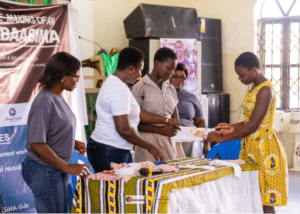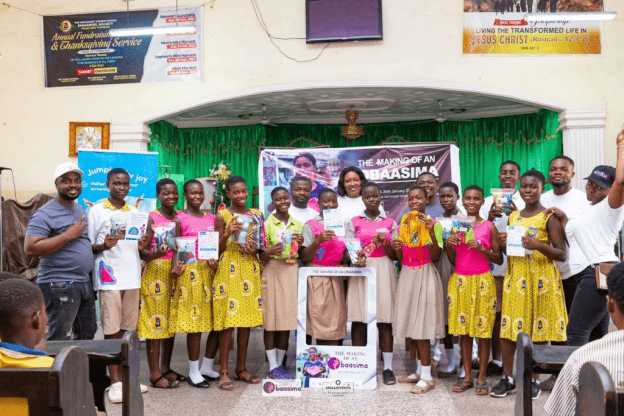The Obaasima Project, an initiative by #TeamTaadi, an eight-member group of students from Kwame Nkrumah University of Science and Technology (KNUST), has provided hands-on training on the making of reusable pads, detergents, and education on good menstrual hygiene to about 300 pupils of Nana Baidoo Bonsoe and Methodist Basic School, both at Poasi, New Takoradi, in Sekondi-Takoradi Metropolis.
The team further distributed about 250 pieces of reusable sanitation pads, five boxes (80 pieces) of paper towels, 250 exercise books and pens, as well as other educative materials and souvenirs to the pupils.
#TeamTaadi also facilitated the registration of 100 pupils (58% female) onto the National Health Insurance Scheme (NHIS). #TeamTaadi also formed a 10-member Obaasima Club in the school to serve as peer educators on menstrual hygiene and other health related issues.
The Obaasima Project, is essentially a menstrual health and/or hygiene drive to reduce menstrual poverty among girls in deprived areas. This is an important component of promoting gender equality, ensuring access to education and health, as well as achieving several Sustainable Development Goals (SDGs) set by the United Nations. Therefore, the making of an Obaasima is critical to achieving several of the SDGs and promoting menstrual health and hygiene is essential for advancing gender equality, promoting health and well-being and then reducing inequalities.
The Obaasima Project, by #TeamTaadi, is a requirement for MSc Development Management by the Institute of Distance Learning (IDL) where team members are expected to identify and undertake a Social Entrepreneurship and Philanthropy (SEAP) project in the society.
WHY THE OBAASIMA PROJECT?
Menstruation and menstrual hygiene remain a challenge to many a girl child in Ghana. Statistics show a pressing need for investment and efforts to improve menstrual hygiene in Ghana, including access to menstrual products, education and awareness, and improved sanitation facilities.
According to Miss Rose Agbesi, the School Health Education Program Coordinator) (SHEP) Coordinator at Nana Baidoo Bonsoe Basic School, “girl’s menstrual hygiene has been one of the biggest problems in the school and Poasi community. It becomes difficult for the female students to participate in teaching and learning during this period. Again, it is tough for the girls to concentrate on their studies and also cope with their menstrual challenges. Some girls skip school especially when they begin to menstruate”.
This insight, by a teacher of Nana Baidoo Bonsoe Basic School is in line with research by United Nations Children’s Fund (UNICEF), where one in 10 girls in Ghana fails to go school during their menstruation due to lack of menstrual products and poor sanitation facilities. Where one, out of five girls between the ages 15- 19 feel excluded from school, social and home activities during their menstruation there is a real impact on the education and prospects of the girl-child. 40% of absenteeism in basic schools is also attributed to menstruation. The high cost of sanitary pads as a result of the whopping 20% import tax on sanitary pads makes it a luxury for many girls to afford. Many girls therefore stay away for five days when they are menstruating.
These statistics, highlights the need for increase in education and awareness about menstrual health and hygiene. And it is supported by research through WaterAid which revealed that only 26% of women in Ghana have comprehensive knowledge of menstrual hygiene.
The cost of menstrual products, can be a significant barrier for many women and girls in Ghana, who may already be facing economic challenges. A pack of sanitary pads can cost up to 30% of a woman’s daily income. These, coupled with the high cost of sanitary pads tend to keep pupils from school.
THE OBAASIMA PROJECT
In the making of an Obaasima, #TeamTaadi organized a two-day workshop and training programme for the students of Baidoo Bonsu Basic School and Methodist Basic School.
Menstrual Hygiene Workshop
In 2016, a study by Ghana Education Service and UNICEF revealed that majority of girls do not have accurate information on menstruation before their first menstruation. In response to this, #TeamTaadi, in collaboration with Marie Stopes and Ghana Health Service, organized a menstrual hygiene workshop for pupils of Baidoo Bonsu Basic School and Methodist Basic School, where about 150 pupils attended ‘80%’ represented female.
In educating the pupils, Henrietta Ataah Kaakyire, an officer from Marie Stopes International, Ghana, enlightened the girls on understanding menstrual cycle and ensuring good personal hygiene during menstruation. She also educated the girls on proper disposal of used sanitary pads and explained that “some girls have between three -seven days to menstruate. Therefore, it is very important for each girl to understand their menstrual cycle and also ensure menstrual proper hygiene so as to prevent them from body odor. Girls must visit the hospital to seek professional advice on any unwanted symptoms instead of self-medication which could have dire consequence on their menstrual health. During this period, please abstain from sex lest you become pregnant”.
During the discussion, a representative of Ghana Health Service, Alberta Hagan also entreated the pupils to “eat a balanced diet and maintain good personal hygiene”.

Hands-on skills training, donation of sanitary pads and NHIS registration
To respond to menstruation poverty where girls do not have access to menstrual materials and the high cost of sanitary pads due to the 20% import tax imposed on pads by the Government of Ghana, the team set out to educate the pupils on how to sew reusable sanitary pads with local materials. The students were also trained on the making of detergents to be used to ensure good menstrual hygiene.
#TeamTaadi also formed a 10-member Obaasima Club in the school to serve as peer educators on menstrual hygiene and other health related issues.
After the training, #TeamTaadi supplied 250 pieces of reusable pads, five boxes (80 pieces) of paper towels, 250 books and pens and other educative materials to enhance hygiene and knowledge on menstruation.
As part of the project, 100 pupils were also registered onto the NHIS scheme. According to the NHIS District Office, 42 of the 100 pupils were new registrants while the remaining 58 pupils renewed their registrations. About 58% of total registrants were female.
PARTNERSHIP AND COLLABORATION
The Obaasima Project is not just a project to make re-usable sanitary pads accessible to the underprivileged. It is also a conscious drive to set up a value chain and to promote other brands.
Marie Stopes Ghana were on board to educate the girls on menstrual hygiene. This helped to provide the needed knowledge to those menstruating for the first time. The students were also provided with some reference materials to aid in their learning of menstruation hygiene. Marie Stopes further introduced the pupils to their #ATOUA counselling ‘a platform by Marie Stopes dedicated to educating teenagers about Sexual Reproductive Health and Rights’ and related issues such as menstrual hygiene, teenage pregnancy among others.
By collaborating with FoodArk Ventures, producers of Mushup Mushroom Digestive Biscuit, the Obaasima Project empowered seven mushroom farmers from Tebe, a scattered settlement at Tarkwa, in the Tarkwa Nsuaem Municipality. Mushroom which is a basic ingredient to the Mushup Biscuit is cultivated by these seven beneficiary farmers of the Youth in Organic Horticulture Production (YouHoP) project. As a sponsor, products from FoodArk Ventures, that is (Mushup biscuit) were displayed to about 600 students and other markets within the environs of Sekondi-Takoradi. With the introduction of the Mushup biscuit to an expanded market in Sekondi-Takoradi, the Obaasima Project have helped to keep the 12-member production team at FoodArk and Seven-member YouHoP farmers in business.
The Obaasima Project in collaboration the National Health Insurance Scheme (NHIS) enhanced access to health care for 100 pupils of Nana Baidoo Bonsoe Basic School and Methodist Basic School. By bringing the registration to the doorstep of the students, it will help shore up the mobilization drive of NHIS.
To confront the high cost of pads because of the 20% import tax by government and to ensure sustainability of the Obaasima Project, the team partnered with the Orange Girl Foundation, a local entrepreneur in the manufacturing of reusable pads, to train the girls on how to design and make a simple homemade reusable pad with local fabrics. This is to enhance access to sanitary pads and even open them to economic opportunities so some girls could make these pads for sale. This Foundation, produced pads with local and less expensive materials thereby making it accessible to all. The pads are sewn by artisans who are hired on a temporary basis by the Foundation. Proceeds from the sale of these pads are used to fund the activities of the Foundation. The Obaasima Project therefore promotes, indirectly, and enhances the production of pads thereby making it accessible to all girls. By the purchase of these re-usable pads, the Obaasima Project keeps 12 youth in gainful employment.
The girls would also be educated on how to hygienically maintain the pads. The over 300 pupils were also trained in how to make these detergents with some basic materials.
It is therefore safe to say that the Obaasima Project with its attendant activities is not just about menstrual hygiene but also a conscious effort to provide the needed opportunity to sponsors who hitherto were unknown. The Obaasima Project is therefore that steppingstone which is needed by some collaborating brands to greatness.
PROJECT SUSTAINABILITY
To ensure sustainability of Obaasima Project, #TeamTaadi is collaborating with Marie Stopes to link the Obaasima Club, a peer educator and menstrual hygiene club, to a menstrual health professional who would monitor the activities of the club. #TeamTaadi is also scheduled to visit the club every quarter to educate and monitor the activities of the club.
The team has bought a sewing machine for the Obaasima Club to be used to sew some reusable sanitary for distribution to pupils in need.
#TeamTaadi has also commenced processes to register the Obaasima Project as an NGO to reach out to other vulnerable girls in other schools.
ACHIEVING THE SDGs BY AN OBAASIMA
Menstrual hygiene is an important component of promoting gender equality, ensuring access to education and health, and achieving several Sustainable Development Goals (SDGs) set by the United Nations. The making of an Obaasima by #TeamTaadi is therefore linked to the achievement of about five :
SDG 3: Good Health and Well-being – Menstrual hygiene is critical to maintaining good health and well-being for women and girls. Access to menstrual products, clean water, and sanitation facilities are essential to prevent infections and other health issues.
SDG 4: Quality Education – Menstrual hygiene plays a crucial role in ensuring that girls can attend school regularly and without interruption. Lack of access to menstrual products, clean water, and sanitation facilities often leads to absenteeism and dropouts.
SDG 5: Gender Equality – Menstrual hygiene is a crucial aspect of promoting gender equality. It is essential to ensure that girls and women have access to menstrual products, information, and education about menstruation, and safe and hygienic sanitation facilities.
SDG 6: Clean Water and Sanitation – Access to clean water and sanitation facilities is critical for menstrual hygiene management. Lack of access to these resources often leads to unhygienic and unsafe menstrual practices, which can lead to infections and other health issues.
SDG 10: Reduced Inequalities – Menstrual hygiene is a critical aspect of reducing inequalities, especially for girls and women living in poverty or in rural areas. Access to menstrual products, clean water, and sanitation facilities can help break down barriers to education and employment.
Overall, menstrual hygiene is critical to achieving several of the SDGs, and promoting menstrual health and hygiene is essential for advancing gender equality, promoting health and well-being, and reducing inequalities.










